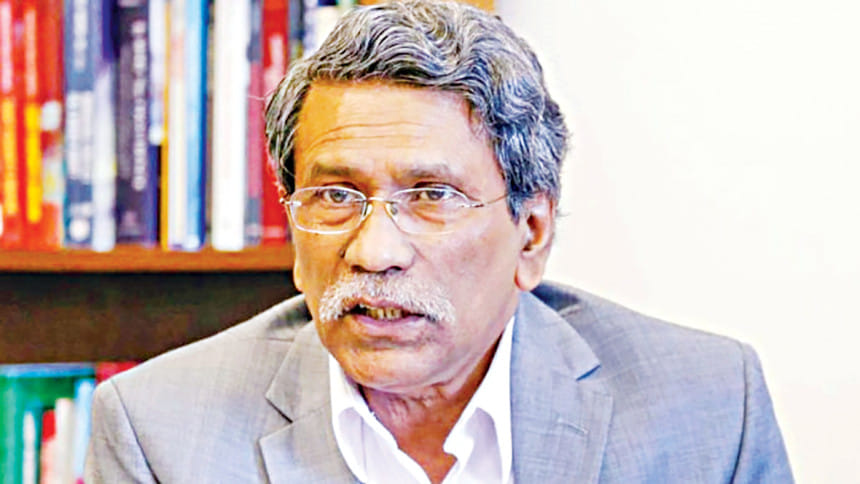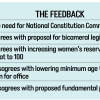Consensus talks: Parties differ on how to appoint chief adviser

Political parties yesterday reached a consensus on reinstating the caretaker government system but remained divided over its jurisdiction and the method of appointing the chief adviser.
On the eighth day of the second round of talks with the National Consensus Commission, the parties also agreed to form a specialised committee to assist the Election Commission in demarcating electoral constituencies.
The BNP and its allied parties, and the National Citizen Party (NCP), opposed involving the judiciary in the appointment of the chief adviser.

The commission does not wish to push any single idea [about CA's appointment], but rather seeks a durable, organic solution through consensus.
The Jamaat-e-Islami supported a role for the judiciary during the discussions at the Foreign Service Academy.
The NCP and several other parties strongly opposed the idea of the president assuming the role of chief adviser under any circumstances. The BNP did not clearly state its position on this issue.
The NCP proposed that the chief adviser be appointed by an All-Party Parliamentary Committee comprising members from both the treasury and opposition benches. The Jamaat and NCP also proposed that local government elections be held under the caretaker government, which the BNP, its like-minded parties, and leftist groups opposed.
Briefing reporters after the meeting, Prof Ali Riaz, vice-president of the consensus commission, said the parties agreed on restoring the caretaker government system and forming a committee to assist in redrawing parliamentary boundaries.
"Various opinions were shared, and discussions also took place on the process of appointing the chief adviser. Political parties are now very close in their positions. The discussions have been very positive," Riaz said.
The commission floated discussions on redrawing electoral boundaries and the president's power of clemency, but the latter was not addressed yesterday.
For the chief adviser's appointment, three options were proposed. The first is following the procedure outlined in the 13th Amendment to the Constitution. The others are appointment through parliament, or through a National Constitutional Council.
Riaz mentioned two proposals on the caretaker government's duration: the Constitutional Reform Commission suggested 90 days, while the Electoral Reform Commission recommended 120 days.
Speaking to The Daily Star, Riaz said, "We have kept all proposals on the table. The commission does not wish to push any single idea, but rather seeks a durable, organic solution through consensus."
According to the 13th amendment, the immediate past chief justice should serve as chief adviser. If he or she is unavailable or unwilling, the president may select from among former chief justices. In case none of them are available, the chief adviser is supposed to be picked from retired Appellate Division judges. If all options are exhausted, the president may, in consultation with major parties, appoint a qualified citizen, or, as a last resort, assume the role himself.
The caretaker government system was introduced after the fall of the Ershad regime in 1990. It became a permanent feature following Awami League-led protests in 1996 and was used until 2007–08, when a military-backed caretaker government took power. Then-president Iajuddin Ahmed controversially served as chief adviser from October 2006 to January 2007.
In 2011, the Awami League abolished the system through the 15th amendment, despite opposition calls to retain it.
In December last year, the High Court struck down part of the amendment that had scrapped the non-partisan caretaker government system.
BNP Standing Committee member Salahuddin Ahmed said that all parties had broadly agreed on restoring the system and that the BNP had proposed reforms to avoid past controversies.
"Specifically, the BNP does not support judicial figures being appointed as chief advisers and instead wants a new, inclusive mechanism to be developed with political consensus," he said.
The BNP proposed limiting the caretaker government's tenure to 90 days, with a one-month extension in emergencies such as Act of God. It opposed including local government elections under the interim administration, arguing they would require too much time.
NCP Joint Convenor Javed Rasin said the party proposed forming an 11-member All-Party Parliamentary Committee, with each party nominating three candidates. A candidate with an 8-3 majority would be appointed chief adviser.
"If consensus fails, the matter would go to an upper house formed through proportional representation, which could use instant run-off voting to select a chief adviser from among the proposed names," he said.
Rasin stressed that the judiciary should not be involved in the process. "Bangladesh's past experience shows that transitions often lead to violent confrontations. To prevent this, we proposed a democratic mechanism," he said.
Jamaat Nayeb-e-Ameer Syed Abdullah Mohammad Taher proposed that the immediate past chief justice serve as chief adviser. If no retired chief justice is available, the next most senior retired justice could be considered. If no consensus is reached, the president should appoint a mutually agreed-upon individual in consultation with parliamentary parties, as was done in the appointment of Justice Shahabuddin Ahmed in 1991.
Taher rejected the proposal that the president lead the caretaker government in the absence of consensus, warning it could trigger a repeat of a past crisis. Jamaat also proposed holding both national and local government elections under the caretaker government and supported a four-month term for the interim government, extendable by two months if needed.
Ali Riaz hoped that a consensus on these issues could be reached "very soon". And with the cooperation of the political parties, the commission would be able to prepare the July Charter, a document that will outline reforms agreed upon by them, within this month, he said.
The political parties will sign the charter, and whoever comes to power, the future government will be bound to carry on the reforms.
'HIGHEST SUPPORT'
While talking about a perception that the BNP was not agreeing with the majority of reform proposals, Salahuddin said the party has so far extended the highest level of cooperation in the efforts to build a national consensus.
"We have agreed to most of the proposals. If we had to agree to 100 percent of the proposals, then there would be no need for discussion at all," he said.
The party has agreed to 46 out of 47 recommendations made by the Anti-Corruption Commission Reform Commission, 127 out of 208 recommendations made by the Administrative Reform Commission, he said.
Salahuddin also said that the BNP directly agreed to 62 of the Judicial Reform Commission's 89 recommendations. Of the 243 recommendations made by the Electoral Reform Commission, the BNP agreed to more than 140.
The BNP leader said his party agreed that opposition MPs will chair at least four key parliamentary standing committees, and another proposal to allow MPs to vote against party lines, except on no-confidence motions and money bills.
Regarding the chief justice's appointment process, parties have agreed that the president should appoint the chief justice from among the two most senior judges of the Appellate Division.
Salahuddin said the BNP also agreed to a proposal to slap a 10-year cap on any person to serve as prime minister in their lifetime.

 For all latest news, follow The Daily Star's Google News channel.
For all latest news, follow The Daily Star's Google News channel. 








Comments